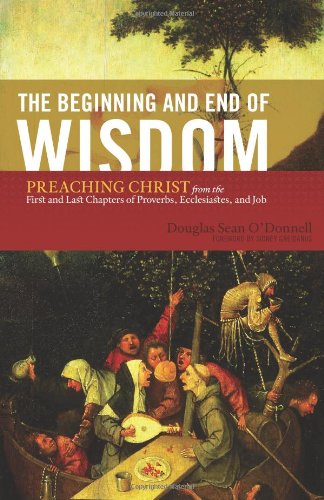Douglas Sean O’Donnell. The Beginning and End of Wisdom: Preaching Christ from the First and Last Chapters of Proverbs, Ecclesiastes, and Job. (Wheaton: Crossway, 2011). 235 pages. $17.99
 In the coming years when readers consider the Douglas O’Donnell corpus, the particular volume under review will emerge as a significant example of his literary oeuvre. This is so because it combines his major strengths—poetry, homiletics, and a Christ-centered reading of redemptive history—all in the service of the church. How can we be so sure that Pastor O’Donnell will have amassed a corpus? This is O’Donnell’s other gift: writing in a way that makes it near impossible to put down his books.
In the coming years when readers consider the Douglas O’Donnell corpus, the particular volume under review will emerge as a significant example of his literary oeuvre. This is so because it combines his major strengths—poetry, homiletics, and a Christ-centered reading of redemptive history—all in the service of the church. How can we be so sure that Pastor O’Donnell will have amassed a corpus? This is O’Donnell’s other gift: writing in a way that makes it near impossible to put down his books.
The Beginning and End of Wisdom: Preaching Christ from the First and Last Chapters of Proverbs, Ecclesiastes, and Job has a central concern. In view of the fact that Old Testament Wisdom Literature can be so daunting to interpret and preach, O’Donnell demonstrates how preachers can thoughtfully, responsibly, and even artistically connect the dots between the Hebrew context to Jesus in the New Testament. Toward this end, he shares six “Christocentic” sermons, as the subtitle states, that probe into the often-overlooked gospel elements of the Wisdom genre. Endnotes offer further insight into these challenges and opportunities, appendices contain help for preachers, and a seventh chapter, “How Shall Wisdom Be Preached?” provides specific advice on moving from the Old to the New Testament.
According to O’Donnell, Old Testament Wisdom books present issues of grave and mundane importance: e.g., the meaning of suffering, the vocational significance of one’s work, relational dynamics between a husband and wife. But this is only one reason why they are critical for preachers to exposit. They are also essential for the way they humble us before God. In his words:
“It is more helpful, I dare say, than any other part of the Bible. These three books put us in our place. We can dig deep into the recesses or human knowledge. We can mine diamonds from the caverns of human existence, experience, and observation. But we cannot find wisdom, that wisdom which is heavenly—“from above”—from the one who “is above all” (John 3:31). We have “earthly wisdom” (2 Cor. 1:12). But the Lord alone has heavenly wisdom. He alone is wise (Job 28:23-27; 37:1-42:6).”
The scope and sequence of O’Donnell’s expositions are as follows:
Chapter 1. Ship of Fools (Proverbs 1:1-7)
Chapter 2. Imperishable Beauty (Proverbs 31:10-31)
Chapter 3. Why Work? (Ecclesiastes 1:1-11)
Chapter 4. Repining Restlessness (Ecclesiastes 12:13-14)
Chapter 5. The Devil’s Question (Job 1:1-12)
Chapter 6. My Servant (Job 42:1-17)
Chapter 7. How Shall Wisdom Be Preached?
O’Donnell steadily pushes into the central question: how does this passage lead one to anticipate the Savior? The question appears like an eagle swooping unerringly upon its prey, never losing sight of the preacher’s priority to proclaim Christ crucified. Indeed, if I may switch the metaphor, this is the keystone that holds together his method; it is reasoned upon, pondered, traced through difference contexts, until this structure of thought is revealed as the foundation on which biblical exposition is properly built.
Sprinkled generously throughout this volume are poignant quotes that you’ll want to put into your file. Some are created by O’Donnell (e.g., “[Christ] takes decaying apples that have fallen to the ground and births from them a vast and beautiful and everlasting orchard,” 76) and others are classics of which he reminds us (e.g., “The dust of vein glory often clings to the feet of the preacher,” 119).
O’Donnell’s final chapter, “How Shall Wisdom Be Preached?” provides practical tips for navigating the twists and turns that Christocentric interpreters inevitably encounter. There are five in all. Specific reference is made to the particular hermeneutic and homiletical decisions that O’Donnell makes in his sermons, explaining the rationale of his method, especially the covenantal connections that lead him to Jesus. These Christ-directed avenues include 1) ethics, 2) types, 3) thematic aspects of Jesus’ teaching, 4) gospel illustrations, and 5) what he calls “gospel awe”—our attitude towards the God we preach. This section might benefit from brief interaction with the work of text book homileticians and theologians in the interest of helping students understand how the disciplines of theology and preaching hang together (i.e., how the Fallen Condition Focus of Bryan Chapell relates to tip four, or considering Greg Beale’s New Testament Theology in light of tip two). Nevertheless, this chapter succeeds in explaining the logic of his approach, and it illumines the way for others.
Perhaps the biggest strength of this book is the way it exemplifies Christ-centered preaching. In a day when buzzwords like “Christocentric” or “Christotelic” are commonplace, it’s helpful to see actual examples of these methods for the preacher who is committed to carefully explicating the Old Testament context before he showcases Jesus and the gospel. In this way, O’Donnell provides useful lessons that not only instruct pastors on the homiletic process; they also illustrate the preaching pastor’s weekly sequence of digging into the text, wrestling with its content, and moving to behold and proclaim the glory of the all-wise God in the face of Jesus Christ.
*****
Chris Castaldo serves as director of the Ministry of Gospel Renewal for the Billy Graham Center at Wheaton College. He is the author of Holy Ground: Walking with Jesus as a Former Catholic and a main contributor to Journeys of Faith: Evangelicalism, Eastern Orthodoxy, Catholicism, Anglicanism (January 2012). He blogs at www.chriscastaldo.com.




